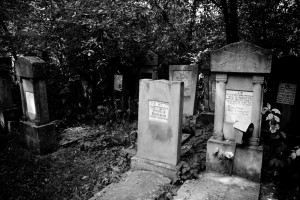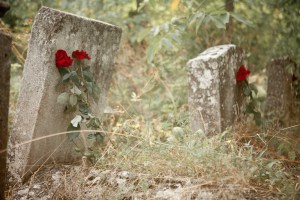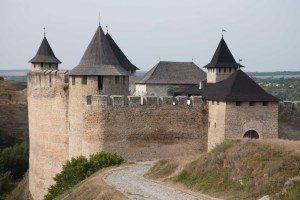 So here I am back at the shtetl. Khotyn, Ukraine, home of my grandfather and his family and who knows how many generations before him.
So here I am back at the shtetl. Khotyn, Ukraine, home of my grandfather and his family and who knows how many generations before him.
We arrived in Khotyn, interpreter, driver and I, and knocked on the door of Srul (Alexander) and Fonya Weinstein, 2 of the remaining 29 jews in Khotin. Srul is the leader of the community, or at least of the synagogue. They are in their mid/late 70s.  I asked if there were any younger people in the jewish community there and they said that the youngest were two women in their mid 50s. They told me that once these Jews die off that there will not be any left here. It’s very sad really since it was actually once a very vibrant Jewish community. Somehow, they both managed to survive concentration camps during WWII. They apparently chose to not go to Israel with many other survivors because their daughter and son-in-law had chosen to stay behind in Moldova and they wanted to be near to them to help out.
I asked if there were any younger people in the jewish community there and they said that the youngest were two women in their mid 50s. They told me that once these Jews die off that there will not be any left here. It’s very sad really since it was actually once a very vibrant Jewish community. Somehow, they both managed to survive concentration camps during WWII. They apparently chose to not go to Israel with many other survivors because their daughter and son-in-law had chosen to stay behind in Moldova and they wanted to be near to them to help out.
 At one point I was sitting on the couch there and Fonya was sitting next to me and I started to cry lightly. I felt once again that I was with “my people” and it touched my heart. I wanted to fall into her arms but that felt like it would have been a little much for strangers. She offered to fry us some eggs and I eagerly accepted. We ended up with a simple spread of fried eggs, bread, tomatoes and a spread of cheese/sour cream. I think that last part was home made. I was so touched by this meal. I don’t know if you’ve ever had the experience of wishing you could spend some time one more time with someone you loved but who had died? Well this experience felt like I was being fed by my Russian Jewish grandmother Sonia. She’s been dead for a long time now, but as I was sitting there, I was savoring the experience of being with her one more time. How sweet it was. I kept eating because I didn’t really want it to end. I told them that although I knew that they were much too young to be my grandparents, that it still felt like my grandmother feeding me again. They seemed to be touched by that and Fonya told me that she feeds her grandson exactly the same way. I also told Srul that his facial features around his upper lip and mouth were very much like my grandfathers. I also showed them pictures of the Zeldmans while they were in Khotyn and they asked various questions. I gave them copies of some of them.
At one point I was sitting on the couch there and Fonya was sitting next to me and I started to cry lightly. I felt once again that I was with “my people” and it touched my heart. I wanted to fall into her arms but that felt like it would have been a little much for strangers. She offered to fry us some eggs and I eagerly accepted. We ended up with a simple spread of fried eggs, bread, tomatoes and a spread of cheese/sour cream. I think that last part was home made. I was so touched by this meal. I don’t know if you’ve ever had the experience of wishing you could spend some time one more time with someone you loved but who had died? Well this experience felt like I was being fed by my Russian Jewish grandmother Sonia. She’s been dead for a long time now, but as I was sitting there, I was savoring the experience of being with her one more time. How sweet it was. I kept eating because I didn’t really want it to end. I told them that although I knew that they were much too young to be my grandparents, that it still felt like my grandmother feeding me again. They seemed to be touched by that and Fonya told me that she feeds her grandson exactly the same way. I also told Srul that his facial features around his upper lip and mouth were very much like my grandfathers. I also showed them pictures of the Zeldmans while they were in Khotyn and they asked various questions. I gave them copies of some of them.
 Our first stop was the Synagogue which was well kept but in state of disrepair as well. They simply haven’t the money to make all the repairs needed. It was sweet. Srul gave me a yarmulke to wear and he said a prayer in Russian for my health and the well being of all of my family, both older and younger than I. I gave him a little money for the synagogue and then we went off to the
Our first stop was the Synagogue which was well kept but in state of disrepair as well. They simply haven’t the money to make all the repairs needed. It was sweet. Srul gave me a yarmulke to wear and he said a prayer in Russian for my health and the well being of all of my family, both older and younger than I. I gave him a little money for the synagogue and then we went off to the  Jewish cemetery about 3 miles away. It was a beautiful place but a place of much suffering as well. Amazing to see how many death dates were in the early 1940s from the WWII time. We went looking for gravestones with the Zeldman name on it, but they had warned me it would be very difficult to find as no one in the community can read Hebrew and it’s quite likely that the graves from back at the turn of the century or earlier had been written in Hebrew. Most of the old stones were near impossible to read as well. Newer ones are made of granite which I think will stand the test of time better. We were unsuccessful, but Srul again said a prayer for Mandel Zeldman (one of my grandfather’s younger brothers) and for Rifka (my great grandmother) both of whom died while still in Khotyn, I asked for some time alone and I wandered until I found some old graves with undecipherable writings on them and honored
Jewish cemetery about 3 miles away. It was a beautiful place but a place of much suffering as well. Amazing to see how many death dates were in the early 1940s from the WWII time. We went looking for gravestones with the Zeldman name on it, but they had warned me it would be very difficult to find as no one in the community can read Hebrew and it’s quite likely that the graves from back at the turn of the century or earlier had been written in Hebrew. Most of the old stones were near impossible to read as well. Newer ones are made of granite which I think will stand the test of time better. We were unsuccessful, but Srul again said a prayer for Mandel Zeldman (one of my grandfather’s younger brothers) and for Rifka (my great grandmother) both of whom died while still in Khotyn, I asked for some time alone and I wandered until I found some old graves with undecipherable writings on them and honored  those graves with 2 roses apiece as if they were the graves of Mandel, Rifka and of other ancestors. Some tears came up, this time they were the tears of my grandfather for when his brother died, but as the tears came up, it felt like they got blocked. My experience in my grief was that my grandfather closed up at that time, that the grief of losing his younger brother was too much for him to open to. So I think I uncovered an ancestral emotional blockage, which I think carries forward in some ways to this day.
those graves with 2 roses apiece as if they were the graves of Mandel, Rifka and of other ancestors. Some tears came up, this time they were the tears of my grandfather for when his brother died, but as the tears came up, it felt like they got blocked. My experience in my grief was that my grandfather closed up at that time, that the grief of losing his younger brother was too much for him to open to. So I think I uncovered an ancestral emotional blockage, which I think carries forward in some ways to this day.
 I went to the old fortress in town along the Dniester river, explored there a bit and then walked back to town to my hotel. I enjoyed feeling my feet on the ground here knowing that my ancestors walked these same streets. There is something oppressive in the air here though. I had asked Fonya and Srul what it was like being Jewish in this town since the war and they told me that they felt like they are treated like they are less than everybody. Seeing the churches standing proudly, the Stalinist era statues and so many non-jews here, I was left to feel some of the oppression that my grandfather and his family must have felt at the time that they lived here.
I went to the old fortress in town along the Dniester river, explored there a bit and then walked back to town to my hotel. I enjoyed feeling my feet on the ground here knowing that my ancestors walked these same streets. There is something oppressive in the air here though. I had asked Fonya and Srul what it was like being Jewish in this town since the war and they told me that they felt like they are treated like they are less than everybody. Seeing the churches standing proudly, the Stalinist era statues and so many non-jews here, I was left to feel some of the oppression that my grandfather and his family must have felt at the time that they lived here.
My heart has been sweetly touched by spending some time with my “relatives.” Like I said, even though they are not “blood” relatives, they do feel very much like family, like my people, and as I type this I realize that I feel very protective of them.
Tomorrow I will go to their synagogue, although I’m told there will only be 4 or 5 people there, I just want to be around them a little longer before moving on from here.


6 replies on “Journey to Khotin”
Son,
That was beautiful, thank you. I only wish I was there to share it with you.
Dad
This comment has been removed by a blog administrator.
Thanks for sharing this beautiful story, Ted. (Although, I will admit it made this 50 percent Italian girl cry.)
Beth
I too have Khotin ancestors. (Family name “Goft”). I have just begun my research and your story is very inspiring and touching.
Sharon
Sharon (or others), please contact me directly. I hear from people like you now and again, and perhaps I'll find a site where we can all share stories/resources, etc. ted@tedseymour.com
There are two insults no human being will endure: that he has no sense of humour, and that he has never known troubles.